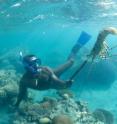World interest in Australian fishery impact test
An Australian method for assessing the environmental impact of marine fisheries has caught the eye of fishery management agencies worldwide. Aspects of the 'ecological risk assessment' (ERA) method have been adopted in the US, Canada, Ecuador, and the Western and Central Pacific, and by the international eco-labelling organisation the Marine Stewardship Council.
The method was developed in research led by Dr Tony Smith and Dr Alistair Hobday from CSIRO's Wealth from Oceans Flagship in association with the Australian Fisheries Management Authority (AFMA).
"AFMA needed a tool for assessing the ecological risk associated with a diverse range of fishing practices: from the hand-selection of rock lobsters in the Coral Sea, to the trawling of Patagonian Toothfish deep in the Southern Ocean," Dr Smith says.
"We met the challenge with a three-step method that considers targeted and incidentally caught species, as well as threatened, endangered and protected species. Ongoing research is further developing the method for habitats and ecological communities.
"Each level of analysis potentially screens out issues of low concern and directs attention to higher risk issues. This helps fishery managers to guard against unacceptable changes to the ecosystem, while being strategic about where to focus dollars and time."
Dr Hobday says the completion of ERA reports for more than 30 AFMA-managed fishing sectors has been a mammoth undertaking involving many years of work by a large research team.
"Our ERA reports document the most comprehensive assessment of the ecological impacts of fishing in Australia's commercial fisheries and for any large set of fisheries in the world," he says.
"More than 1200 species have been assessed, highlighting the diversity of Australian fisheries and pointing to risks requiring analysis and management, both for individual fisheries, and on a cumulative scale."
The ERA process contributes to the strategic assessment of fisheries under the Environment Protection and Biodiversity Conservation Act 1999 and flags priorities for research, data collection, monitoring and management.
AFMA is responding with environmental risk management strategies for each fishery and other initiatives such as a guide for fishery managers to help manage shark bycatch. (Sharks and rays come out repeatedly as high-risk species across many fisheries.)
The research has also yielded a database of information on more than 1000 species of mammals, seabirds, reptiles, scalefish, and sharks and rays.
Source: CSIRO Australia
Other sources
- Fishery Impact Test Developedfrom Science DailyThu, 29 Oct 2009, 5:36:07 UTC
- World interest in Australian fishery impact testfrom Biology News NetWed, 28 Oct 2009, 3:14:10 UTC
- World interest in Australian fishery impact testfrom PhysorgTue, 27 Oct 2009, 17:35:48 UTC
